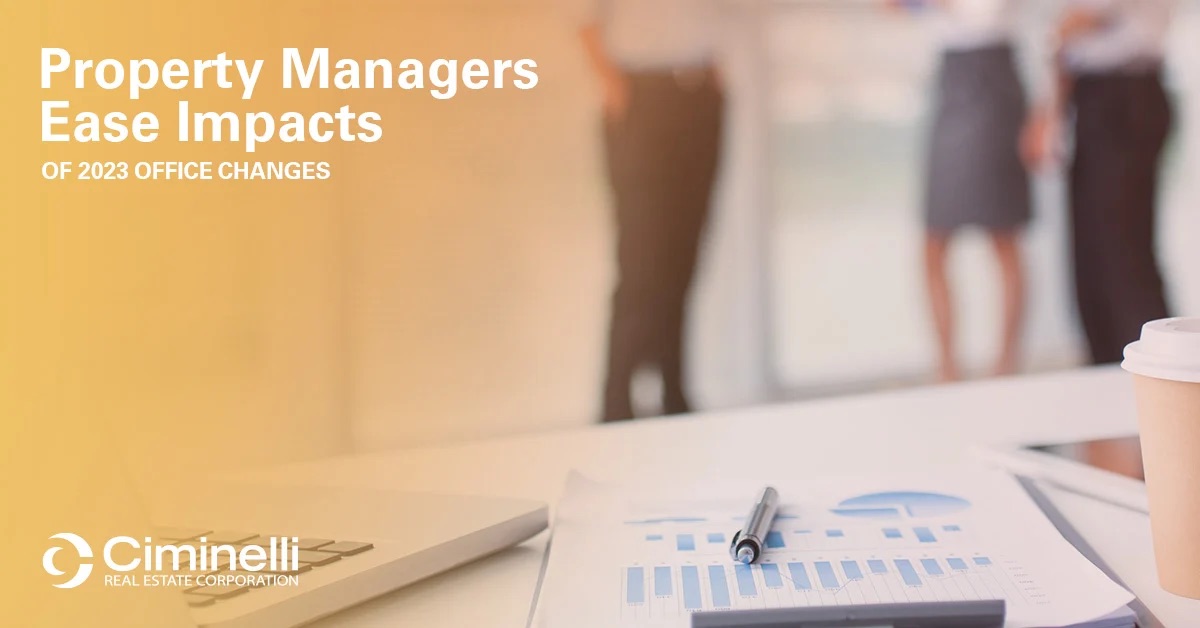
The office environment is constantly changing to meet the needs of businesses, consumers, employees, and the community. Recent years have introduced substantial shifts, adding to the complexities of the natural ebb and flow of office trends. Property Managers are on the front lines of commercial real estate, working to find value, ensure safety and compliance, and create and engage tenants in a meaningful and productive environment. The trends shaping commercial real estate in 2023 are being met with thoughtful solutions by Property Management professionals, the industry, and their partners. A few examples follow:
Hybrid Work
The post pandemic workplace means hybrid work schedules in the majority of offices. Beyond the immediate needs of safety and cleanliness post pandemic, property managers are trying to navigate the absence of employees, irregular occupancy numbers from day to day, and a desire to remain connected from both the office and home. All of these obstacles directly impact the work environment and corporate culture. Property managers have gone to great lengths to work with tenants to reconfigure spaces to create more collaborative areas and have assisted with technology upgrades that help workers stay connected. Tenant and community programming have become a top priority for most, as exemplified by the trend of lunch and afterhours events designed to encourage employees to come together and fully enjoy the office experience.
Greener Policies
The push to make green or sustainable choices in our daily lives is also being felt in commercial real estate. Energy consumption, waste collection, and the interior environment are all areas of focus for Property Managers working to keep pace with the industry and stay ahead of the curve in the search for new and long-lasting tenants. Typically, the low hanging fruit focuses on upgrades to HVAC systems that monitor, adjust, and apply conditioning efficiently to meet the needs of the building. Not a small task, this means working with local utilities, government agencies, and tenants in the building to meet the needs of everyone. However, it no longer stops there as efficiency is being redefined and extends beyond energy consumption. The footprint a building leaves on the community, the way tenants interact in terms of waste disposal, cleaning, and even their green policies are being taken into account. This means Property Managers have to be knowledgeable in a number of areas and communicate effectively to stakeholders ensuring education and understanding of the initiatives they put into place.
Wellness
Health and wellness have always been a focus in modern buildings with tenant focused fitness centers and healthy food offerings meeting the need. 2023 finds Property Managers facing a workforce who have made major life decisions based largely on their health and wellness. Property Managers are working more closely than ever to manage cleaning specifications, performance, and to encourage healthy habits and hygiene through signage programs and reminders. Further, work from home, regular COVID-19 tests, and a dedication to work life balance have combined to increase the emphasis on wellness offerings for tenants. Progressive Property Managers work to develop healthy eating seminars, cooking demonstrations, yoga programs, and more to ensure this box is checked while in the office.
Technology
Most of us have as many virtual meetings as we do in-person during the course of the work week. Working with tenants to modify the technology infrastructure in an office space to accommodate additional video conferencing capabilities was an almost immediate need. However, beyond that, Property Managers have seen a more physical environment- and accessibility-focused movement toward touchless entrances, elevators, restrooms, and other high traffic interfaces within the building. Meeting those needs, and also considering upgrading building technology to more efficiently manage irregularly occupied spaces means Property Managers are conducting a meaningful evaluation of technology systems, identifying shortcomings and opportunities, and making changes to stay ahead of the demand.
In each of these areas, Property Managers are the foundation that holds commercial buildings together. Managing the needs of the building and the tenants to create a productive work environment continues to be a challenge. Keeping up on latest trends, working with a team of professionals, and listening to what tenants and the community are saying will continue to be among the best tools a Property Manager has. If you’re an owner or landlord self-managing your real estate portfolio, the time is right to consider partnering with a professional Property Management team to make the most of current trends.
